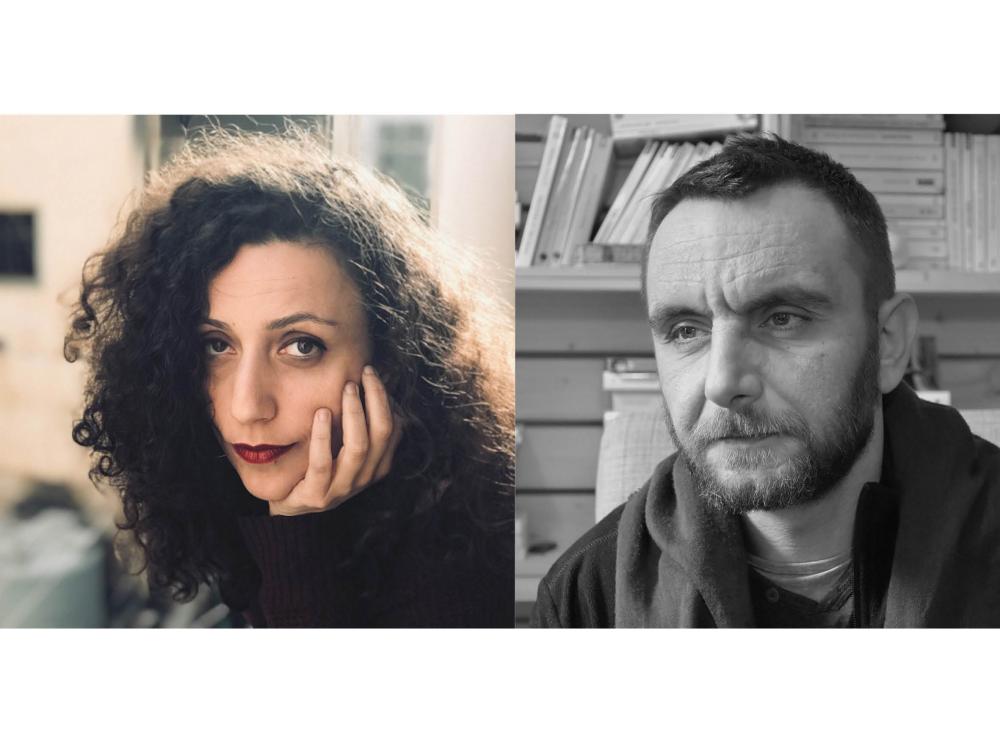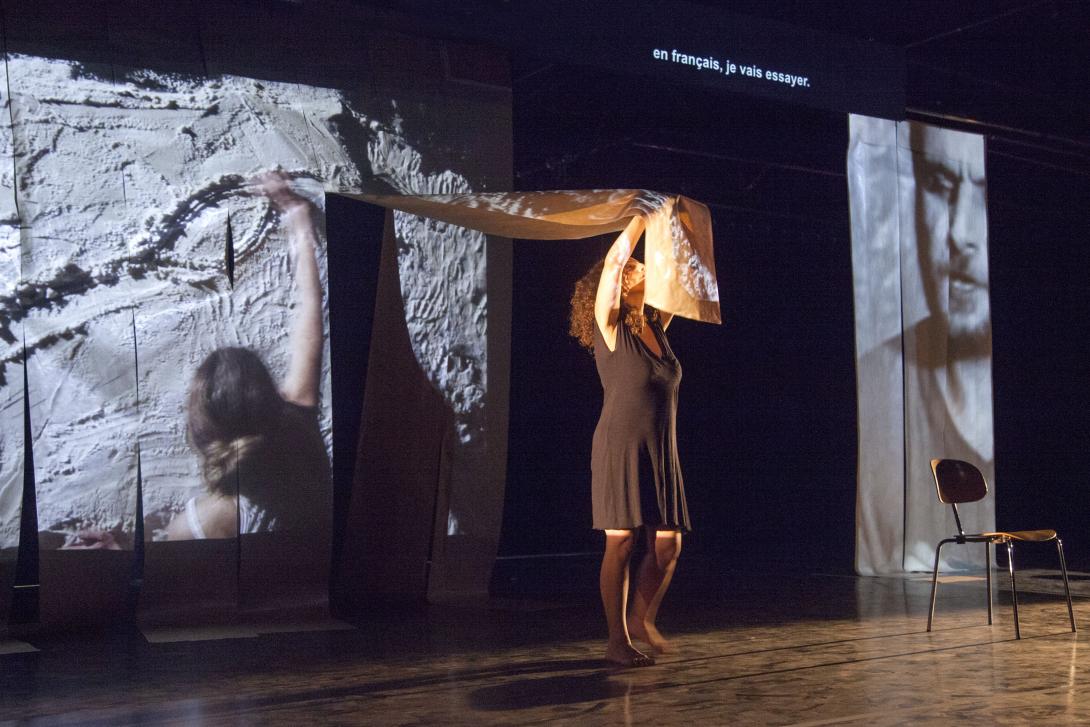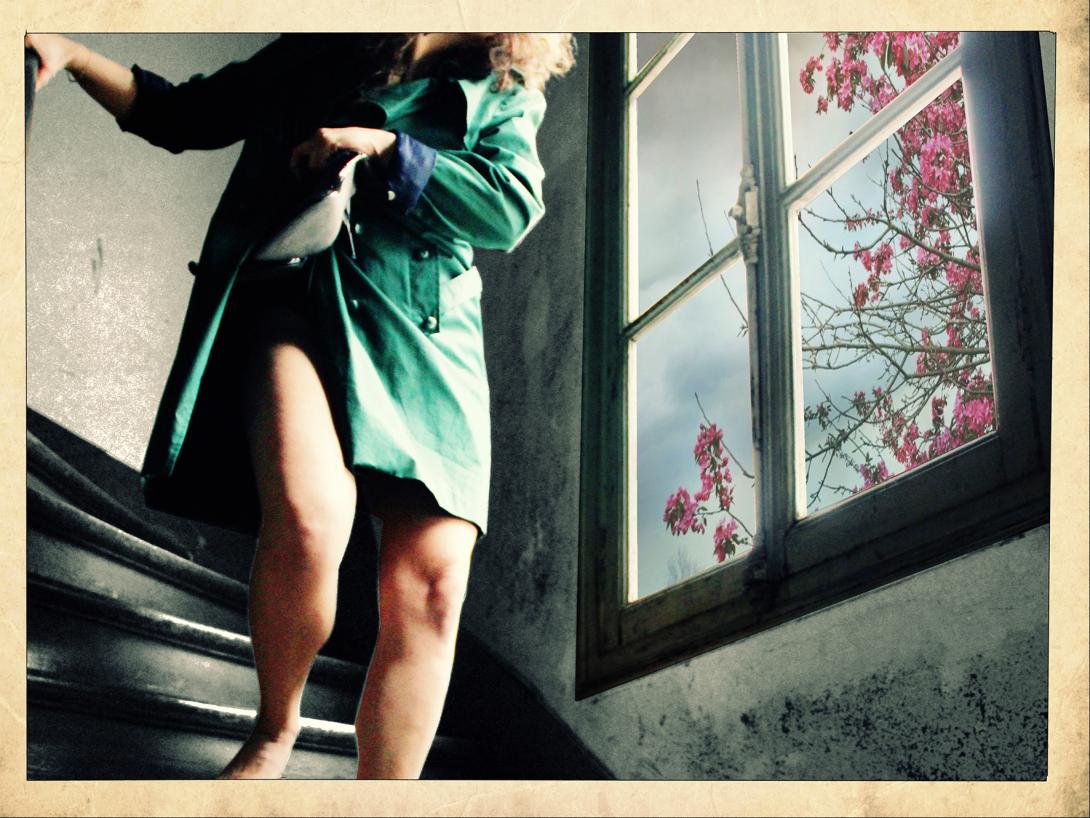IN THE WAR IN SYRIA THERE IS AN EXCESS OF IMAGES, AND YET WE DO NOT SEE VERY MUCH.
A conversation with Chrystèle Khodr & Waël Ali
It was almost as though there were three of us sitting together on a terrace. I drank tea, while Waël Ali and Chrystèle Khodr occasionally lit another cigarette. The only difference was that we were all thousands of kilometres apart. The two artists started collaborating two years ago. Distance and the attendant delays are part of their process and that is by no means a purely negative experience. They will present their first two works at Moussem Cities: Temporary Stay and I once entered a garden.
It is striking that the two works that you will present during the Moussem Cities: Damascus festival are both based on a very specific and intimate moment.
CK: I think a lot of artists’ work begins with very personal questions. Temporary Stay is based on a tape that I found at my mother’s house twenty years ago. My uncle has sent this tape from Sweden to my father in Beirut in 1976; it was the first time he had been in touch since fleeing the war with his wife and two children. In 2015, Waël and I hardly knew each other. He saw my production Beyrouth Sépia during the Sens Interdits festival in Lyon and I saw his piece Je ne m’en souviens plus in Beyrouth. When I decided to work on this tape, I wrote him I wanted to work on the tape and I wanted to do it with him. Waël has a kind of modesty and discretion in his artistic approach, and I was sure that I could trust him with this very personal story.
This tape is thus definitely personal, but it is not so intimate. During the war in Lebanon, people often sent one another audio cassettes with their news. It was a far for people who had stayed and those who had emigrated to stay in touch. We all have particular connections to our past, and we are all in some way displaced. Our collaboration on this project has made the story of the tape take on a new dimension. Our exploration focused mainly on questions about the theatre: how to make theatre today. And how to bring together the reflections of two people who have lived this story in a different way because they each have a very different personal and political past.
What does this tape mean to you, Waël?
WA: The first time I listened to the tape, I was immediately struck by it. And for various reasons. It recalls a distant past; a time that was not yet dominated by images. When we were young in the 80s, we listened to the radio much more than we watched TV. So this is a very particular story, but at the same time, it is very common. In Lebanon, the migrants who left during the civil war recorded their voices, so they could send each other news. Working with an audio medium is a strong contrast with the current war, which is saturated by images.
In the war in Syria there is an excess of images, and yet we do not see very much. I was also interested by the idea that she is an actress who would perform her own story, which allowed us to raise questions about performance and acting itself.
While creating the work, a central question revolved around real stage presence juxtaposed with these voices from the past. These are presences that question and cross-contaminate one another in some way.
After your reflections on theatre itself in Temporary Stay, your second collaboration, I once entered a garden, is not a theatre production but an installation. Is this formal change the result of your questioning?
CK: Not particularly. I once entered a garden largely emerged from the questions of Bissane Al Charif, our scenographer on Temporary Stay. She had already created two installations that were also based on personal themes: her first work, entitled Mémoire(s) de femme, and the second called Sham. Bissane questions the relationship we have with our body, and especially in times of dramatic change or exile. How do we talk about our first sensory experiences? How do we reconstruct the memories associated with our bodies, especially when the places of these memories are no longer accessible?
WA: The form of the installation thus came from Bissane, but it was also more appropriate for this work. It allows for a more intimate or more personal relationship between the viewer, the space, and the stories. The viewers “encounter” these stories and interact with them.
In the installation, you guided Bissane’s questions about the body to a very precise moment.
CK: Inspired by Bissane’s questions, we started looking for a common language with which to speak about this subject and we started conducting interviews with people of various ages. These conversations focused on their first sexual and emotional experiences. Our interviewees came from various neighbouring countries that have suffered under different wars or occupation: Lebanon, Syria, Palestine, and Iraq. The connection between history and place is very important. When you think about Baghdad in the 80s, you might think about the embargo or tear gas, but you wouldn’t think about a boy having phone sex in a big house. Our Iraqi interviewee lived in an enormous mansion and the telephone was in the living room. So his only worry was how to have erotic telephone conversations when everybody was passing through the living room! The great tragedy was that he never saw the girls. He only ever heard their voices on the telephone. Place is also unavoidably present in the case of our 57-year-old Lebanese interviewee. She told us: “When the Israeli army invaded Beirut in ’82, I saw death up-close but instead of thinking about the war, I was thinking about having sex without losing my virginity, instead of making the most of life. How stupid I was!” Our youngest interviewee came from Syria, and her memories go back to before the war. She is trying to recapture this moment of peace one last time. She realizes that the more time passes, the further away people are from the moment of war and the more they can talk about their bodies. She hopes that one day she too can leave her house, enter a garden, smoke a cigarette, and reclaim her story and her body.
Sometimes, when we put the word “war” in a sentence, this word “war” dominates everything. Bizarrely, in I once entered a garden these intimate moments that happened in a period of war remain genuinely tender, even if they occurred during the Israeli occupation or the successive wars in Iraq...
Most of the testimonials in this installation are from women. Was this a deliberate choice or was it easier to find their stories? And why did you decide to include the testimony of one man?
CK: We did not intend to work only with the testimonies of women. We had many conversations with very different people, and from all these conversations, we chose the stories that were connected by a very sensitive thread. It was important to us to include the testimony of a man who spent his adolescence in Baghdad in the early 90s. Listening to these testimonies, it is clear that social repression is exerted both on men and women, though in different ways. Repression and censure are exerted above all on the body, whether the body is feminine or masculine. Where I am from, being a man is as difficult as being a woman.
What is it like for you to present the two works at the same time for the first time? And do you see any connection between the two works?
CK: It was not our intention to make two works that echo one another. These are two different artistic forms, one play and one installation. If there is a continuity, it is due to the fact that the same people created both projects.
I am very touched by the fact that both works will be presented at the same time as part of Moussem Cities: Damascus. I consider myself very fortunate to have been able to work together on two projects despite the geographical distance, which imposes a certain rhythm on the process and which slows down the work sometimes. We were able to find a shared artistic language through which to express our questions and our current theatre practice.
I imagine that the distance slows down the process, but allows you more time to reflect on the work.
WA: The slowness allows you to rethink choices and decisions, to try other possibilities, and to write texts only to rewrite them later on! But slowness is also a choice. With several wars being fought currently, this is a period of loss from a political, artistic, and human perspective. We do not want to go too fast because we are trying to create a bit of distance from our subject and our stories.
To conclude, as already mentioned, the two works will be presented as part of the Moussem Cities festival, which this year is focused on the city of Damascus. Could you tell us what this city means/symbolizes for you?
WA: We do not literally work on the city of Damascus, but its current state and its history are reflected in the places and the narratives that we address. In Titre Provisoire, we worked on the story of a three-generation immigrant family. The story begins at the end of the First World War and continues right up to the actress who is telling the story onstage. This story is also about all of us and about our relationships with the cities of our birth. Every member of the team involved in the play is present on stage, and pieces of all our stories are to be found in the representation of this journey, through the exploration of the theatre itself and the impossibility of telling this story of displacement and repetitive rupture.
A conversation with CHRYSTÈLE KHODR & WAËL ALI, by EVA DECAESSTECKER (Kaaitheater, November 2018). Translated by John Arblaster.


